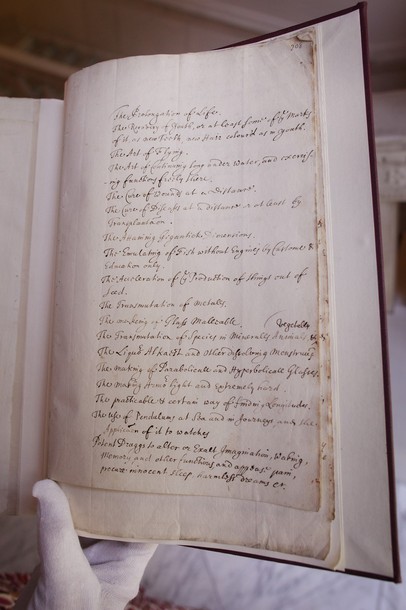Published: June 26, 2010 3:00 a.m.
Exhibit shows 1600s scientist’s foresight of innovations
In the 1660s, English chemist Robert Boyle wrote an extraordinary document, a combination of wish list and predictions of what science might achieve in the coming centuries. Found in his private papers, the list is a centerpiece of the exhibition “The Royal Society: 350 Years of Science,” running until November at the society’s headquarters in London.
Boyle – a founder of the society, the world’s oldest scientific academy in continuous existence – seems to have envisioned airplanes, organ transplants, submarines, commercial agriculture and psychotropic drugs.
Some wishes, such as “The Recovery of Youth, or at least some of the marks of it, as new Teeth, new Hair colour’d as in youth,” seem to have come true, while others, such as “The Transmutation of Species,” remain unfulfilled.
This is the first time the papers have been made available for public viewing.
“This document provides us with an amazing window into one of the most extraordinary minds of the 17th century,” says Jonathan Ashmore, an exhibition spokesman.
Samples from Boyle’s list:
•Prolongation of Life
•The Art of Flying
•The Art of Continuing long under water, and exercising functions freely there
•The Cure of Wounds at a Distance
•The Cure of Diseases at a distance or at least by Transplantation
•The Emulating of Fish without Engines by Custome and Education only
•The Acceleration of the Production of things out of Seed
•The makeing of Glass Malleable
•The Transmutation of Species in Mineralls, Animals, and Vegetables
•The making Armor light and extremely hard
•The use of Pendulums at Sea and in Journeys, and the Application of it to watches
•Potent Druggs to alter or Exalt Imagination, Waking, Memory, and other functions, and appease pain, procure innocent sleep, harmless dreams, etc.
•A Ship to saile with All Winds, and A Ship not to be Sunk
•Freedom from Necessity of much Sleeping exemplify’d by the Operations of Tea and what happens in Mad-Men
•Pleasing Dreams and physicall Exercises exemplify’d by the Egyptian Electuary and by the Fungus mentioned by the French Author
•Great Strength and Agility of Body exemplify’d by that of Frantick Epileptick and Hystericall persons
•A perpetuall Light
